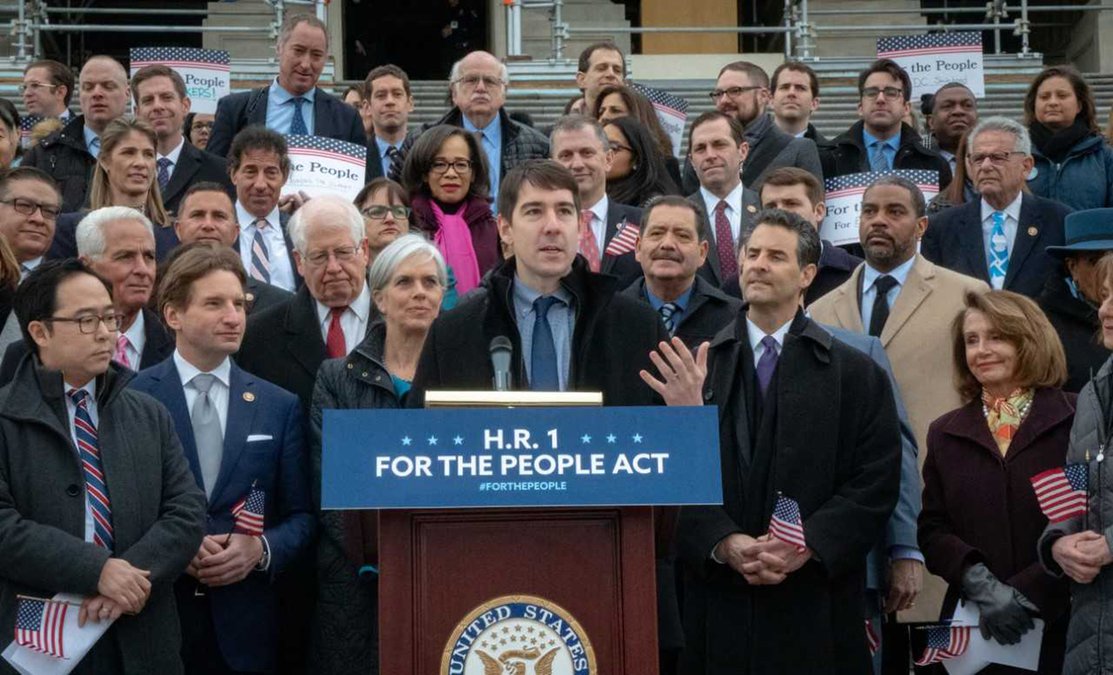House Democrats on Friday officially passed their sweeping anti-corruption, pro-democracy reform bill known as HR 1, or the For the People Act, which included an amendment authored by Rep. Josh Harder that strengthens lobbying disclosures.
The massive piece of legislation aims to get money out of politics and increase transparency around donors, keep a closer watch on lobbying and expand voting rights by implementing aspects like automatic voter registration.
The bill has been described as one meant to restore the public’s trust in the government — something Harder believes has been lost throughout the years of American democracy.
“Most folks believe that special interests and big corporations have far too much influence in Washington, and I think they’re completely correct to think that,” Harder said during a phone call to the Journal from Washington, D.C. after the vote on the bill.
He reflected on one of his first days in D.C., when he was invited to a dinner with his other freshman colleagues which was advertised as policy discussion. But, rather than talking about issues that matter, like affordable healthcare, the creation of jobs and immigration, the group was ambushed by lobbyists who wanted to talk about their own priorities.
“We were obviously at odds,” Harder said. “This is an everyday occurrence in Washington.”
According to Harder, D.C. is home to 11,000 registered lobbyists who take part in organized attempts to influence legislators through monetary means. Harder’s amendment in HR 1 takes a simple approach to ensuring lobbying transparency, requiring that lobbyists who reach out to members of Congress must identify themselves as lobbyists and make it clear who their clients are, or who pays them.
“We’re not going to be able to eliminate the role of lobbyists, but we can make sure that no member of Congress ever has a conversation with a lobbyist without knowing they’re a lobbyist and who is paying for the work they’re doing,” Harder said. “We want to shine a light on some of this behavior.”
There are three main components to HR 1 as a whole, which was the Democrats’ first priority of the year: campaign finance reform, strengthening the government’s ethics laws and expanding voter rights.
The bill establishes public funding of campaigns through small donations by providing a voluntary 6-1 match for candidates for president and Congress, meaning that for every dollar a candidate raises from small donations, the government would match it six times over. This maximum small donation that can be matched would be capped at $200.
This program wouldn’t be funded by taxpayer dollars, but instead via a new, 2.75 percent fee on criminal and civil fines, fees, penalties or settlements with banks and corporations that commit corporate malfeasance.
In addition, Super PACs and “dark money” political organizations would be required to make their donors public, and Facebook and Twitter would need to disclose the source of money for political ads on their platforms and how much money was spent.
“This bill allows us to know who is spending money and trying to influence our electoral system, and empower smaller donors instead of the current reliance on a handful of large billionaires who write massive checks into these political campaigns,” Harder said.
As far as ethics go, the bill would require the sitting president and vice president, as well as candidates for the offices, to disclose 10 years of his or her tax returns, stop members of Congress from using taxpayer money to settle sexual harassment or discrimination cases, create a new ethical code for the Supreme Court and give the Office of Government Ethics the power for more oversight and enforcement while implementing stricter lobbying registration requirements.
“Even though most Americans want to do something about these issues, they keep not happening and keep not happening,” Harder said. “We may never eliminate them, but we’ll make sure the voice of the people has higher priority.”
A new automatic voter registration would ask voters to opt out rather than opt in, and also included in the bill is a provision that would turn Election Day into a national holiday for federal employees, with encouragement to private sector businesses to do the same.
Despite passing the House with a vote of 234-193, the bill is likely dead on arrival in the Senate. Majority Leader Mitch McConnell has vowed he won’t bring it up, and the Trump administration issued an intent to veto the bill on Tuesday despite widespread public support.
In a poll conducted by the Center for Public Integrity last month, 88 percent of those polled agreed that political groups should have to disclose their funding in a timely fashion. A National Tracking Poll conducted by Politico last November found that 77 percent of registered voters said that “passing an anti-corruption bill that would rein in the influence of money and lobbying in Washington” was an important or top priority for Congress after the midterm elections.
In another poll conducted by Fox News last September, more voters (30 percent) called “corruption in Washington” the most important issue than any other issue that was polled.
“The idea that Senate Republicans don’t want to even vote and have a record of where they stand on a bill that has popular support of more than 80 percent of American people...that alone should give you cause about the exact issues we’re talking about here,” Harder said. “It does not pay attention to the voices of ordinary people, and really suggests how severe this problem is.”





